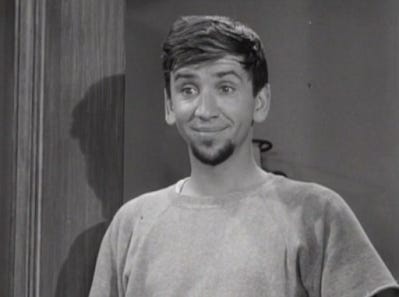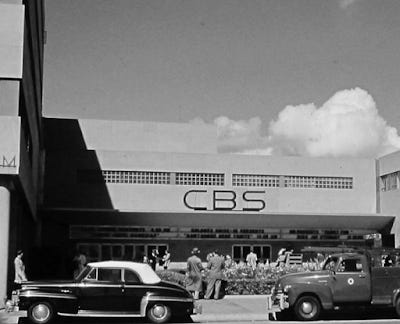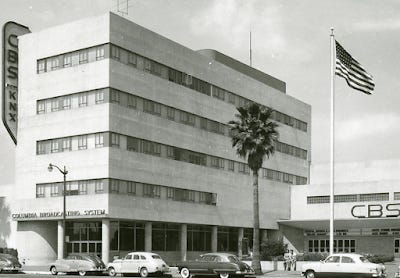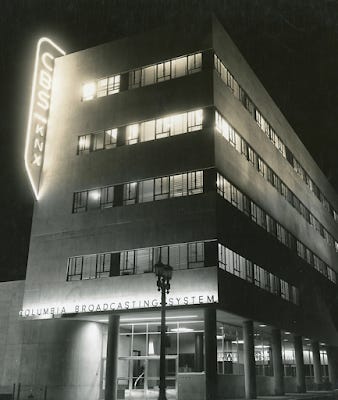Peggy Webber: You have Bob Denver on your shirt.
Kliph Nesteroff: Yes, Gilligan’s Island.
Peggy Webber: Was he a friend of yours?
Kliph Nesteroff: No.
Peggy Webber: He was a very dear friend of mine. He starred in two or three plays for me. He was so dear. Originally he wanted to be a priest and I had wanted to be a nun. So we had a good feeling about each other. He was in the car one day with my publicist and he stopped the car. He said, "That old lady on the corner is trying to cross the street." He stopped the car, walked over to the corner, and helped her cross the street. He was that kind of a person.
Kliph Nesteroff: After he did Gilligan's Island he was a little bit typecast.
Peggy Webber: He didn't like that. He said to me, when it was first offered to him, "That junk. I don't want to do the show, but it will probably be good for my career."
Kliph Nesteroff: He did slapstick comedy very well.
Peggy Webber: Yes with that innocent face.
Kliph Nesteroff: On that show Bob Denver and Alan Hale Jr. were basically doing Laurel and Hardy. Gilligan was this skinny bumbler with an innocent face and the Skipper is taking charge, not all that competently, and just like Oliver Hardy, he's this fat man berating his little buddy, hitting him with his hat.
Peggy Webber: Right, right. Yes. I remember when Bob pushed Alan Napier into my swimming pool.
Kliph Nesteroff: (laughs)
Peggy Webber: (laughs) It was quite a sight! Alan Napier was terribly upset, but they became very good friends.
Kliph Nesteroff: Where was your house at that time?
Peggy Webber: Rustic Canyon. I had a beautiful home there that was like a log cabin. My doctor/husband wanted to live near his sister who was in the next canyon over. Rustic Canyon was a governor's retreat in the 1930s. It was a place where they all had cabins. Governors and retired governors and people who were planning to be governor... all those people were settled in Rustic Canyon. I remodeled the thing. Lee Marvin used to jump into the cesspool and clean out... I forget why he jumped in the cesspool, but he was trying to help us clean it out for some reason. I'm not sure if that was before it was connected to plumbing or not.
We had an area that was U-shaped so I enclosed it with a high-beam ceiling, about 40-feet high and 40-foot long, maybe longer. It was huge. And that became our kitchen and our family room and I did it in black walnut. People raved about it because we built our swimming pool right beyond it, so it looked like it went on forever. And then the hill was coming down from the street behind us, which is where Paul Fix lived. Do you remember Paul Fix?
Kliph Nesteroff: A character actor.
Peggy Webber: He was a very close friend of ours. And then Lee Marvin was on the other side and a few other stars a little further down. It was quite a wonderful experience, my children loved it, and we were right across from the park where they were taught tennis and swimming. It was really a hidden area that the world hadn't discovered yet.
Kliph Nesteroff: Lee Marvin was your neighbor.
Peggy Webber: Yes, and Ted Cassidy. There's a picture of Ted in that China cabinet. He and Bob Denver and a number of people became my [theater] company. It was the Rustic Canyon Theater. All people of note who were already recognized as professionals.
Kliph Nesteroff: Bob Denver lived in Topanga Canyon where Will Geer ran a theater company.
Peggy Webber: First he was married to the script girl on the show, but it's not a very pleasant story. He didn't approve of her... I don't know how to put it.
Kliph Nesteroff: I'm just trying to picture Bob Denver pushing Alan Napier into the swimming pool while Lee Marvin is busy cleaning your cesspool.
Peggy Webber: And Ted Cassidy. He became my good friend. His wife divorced him. She was becoming a psychiatrist and she fell in love with some... Here was poor Ted supporting her so she could get her education, but she fell in love with one of her professors. So his heart was broken. I knew very well how he felt and he came to my front door one day. "I hear that you've opened a restaurant." I said, "Yes, the New Hope Inn." He said, "I'd like to be your partner."
I was dumbfounded. I thought, "Well, if it's something you are really interested in." And he said he was. So I took him on as a partner and we went fifty-fifty in the payment.
Kliph Nesteroff: Where was the New Hope Inn?
Peggy Webber: It was in Rustic Canyon, near Will Rogers State Beach. Prior to that, Lee Marvin was divorcing his wife and they used to take us to dinner down at Ship of Fools. Because he had been in a movie...
Kliph Nesteroff: Ship of Fools, yes. Stanley Kramer.
Peggy Webber: Yes and they named this restaurant after it or something. So he used to take us to dinner, my husband and I.
Kliph Nesteroff: Didn't he have some famous court battle with one of his wives?
Peggy Webber: Lee?
Kliph Nesteroff: Yeah.
Peggy Webber: Well, it was in the headlines for quite a while. It's so involved. The thing was, he was never in love with his wife. He married her because she got pregnant when they were living together, but he wasn't sold on her. So it wasn't a happy marriage. She was a very smart woman. A musician and everything. She became my children's godmother. So did he. He was their godfather.
Lee drank heavily and I always felt it was because he was unhappy. He and I costarred in a live show on CBS. I forget the name of... Front Row Center was the name of it. Yes. We shared the same agent and he was not a star yet. He was getting good breaks. That was how our friendship first started.
Kliph Nesteroff: I saw him in a very early episode of Dragnet where Jack Webb is interrogating him.
Peggy Webber: Yes, he did some of those after I moved to Japan [for two years] with my doctor - husband. I moved back to get my Hollywood career back up, but I ended up moving with him to Durham, North Carolina when he went to get a degree at Duke University. One of Bob Denver's shows came on TV. It was that one he did before. What was it?
Kliph Nesteroff: Dobie Gilis.
Peggy Webber: Yes, Dobie Gillis. And I said to my doctor-husband, "That is going to be a big star." I just knew it. I just knew this fella had it. I was so shocked when I moved to Rustic Canyon to discover he was just a few blocks away up on the hill. I met him somehow and said, "I have a theater group going and it's all well-known people. We do plays twice a year or something. Would you be interested?" He said, "Yes, I would be." And that's how we got to know each other.
Kliph Nesteroff: I heard that you met Edward Everett Horton when you were very young.
Peggy Webber: I met him when I was in high school. I did an interview with him for the school paper. I never worked with him when I came to Hollywood. I was a child. I was still a child when I first came to Hollywood - sixteen going on seventeen.
I had won an audition at CBS. I had gone into CBS the day that I arrived in Hollywood. I didn't know where to go. I had been to all the big buildings in Hollywood, looking at the register, trying to see any name that I might know. I went into a place that looked like an advertising agency. I thought, "That's where the directors will be who are directing all the radio shows." Television didn't exist yet.
So when I got into the office, this advertising office, they didn't do theater. I said, "Is there a director here who does any radio shows?" They said, "Yes." I said, "Could I meet him?" So they went back there and said, "There's a girl out here who wants to see you." And so they send me in and I told them I had had my own radio show in Tucson, Arizona and I would like very much to audition for you. Some of them bit and said, "Sure, sure. Come on in." All of that was not wasted, but... That first day, I'd gone to all these buildings and then I thought, "I should just go to CBS." I had a feeling that you could get in there, that it was open, with this big courtyard and glass windows and everything. It was just past Sunset and Vine.
Bob Carroll, god bless him, red-headed kid, he was a page boy in charge of seating the audience, and he had his own little booth. So I came up to him and told him my sad story. It wasn't sad to me, I just didn't realize how unimportant having my own radio show in Tucson was. I told this to him and I said, "Is there anyway to get employed here?" He said, "If I were you, I'd audition. Come and get put on the list and they'll give you material to read."
I reluctantly signed up because I did not think I'd be capable of doing just anything they would hand me. I found a room for my mother and me. I found a room that was above the stores on Sunset Boulevard. It was a one-room thing where a wall-bed came down and the kitchen was the size of a closet. We were happy because we could afford it.
One day the phone in the hall rang. It had been a week since I had been to CBS. It was Bob Carroll. He said, "Get the hell over here!" I said, "What is it?" He said, "I got an audition for you! I told them all about you! Come right away!" So I ran all the way and I figured if all else failed I could do my impersonations. They said to me, "Do you have material?" I said, "Yes." "Well, then do your material."
There were three people in the booth. One was Ted Wick who had worked for Selznick. One was Edna Best who was married to Herbert Marshall. And then Mercedes McCambridge, who was my favorite actress in radio. She had my favorite voice. I didn't see them until after I did my number. I set up a little story and then did fifteen impersonations. I'd set up a little story about Zasu Pitts coming in on a train and not being able to find her hotel and each person she would stop would be some famous person and I would do them talking to each other.
Everyone came out of the booth laughing and introduced themselves. Edna Best said, "You're going to work my show!" I said, "What is it?" She said, "Sherlock Holmes with Basil Rathbone and Nigel Bruce." I was overwhelmed.
This fellow from Selznick said, "You've got the job." I said, "Well, what is it? What job?" He said, "We need you to do Ingrid Bergman." She had gone back overseas or something and they hired me to do all these commercials she was supposed to have done. And then Mercedes McCambridge was the last one to come over. She came over very quietly, kissed me on the cheek, and said, "You'll be a very big star in radio."























To be continued...I hope!